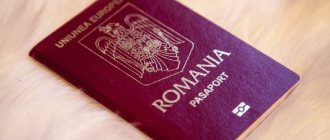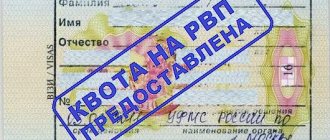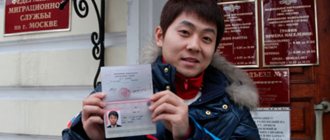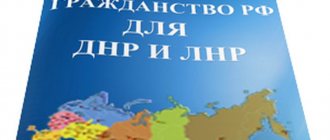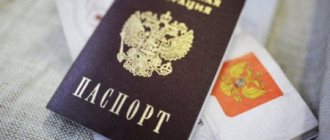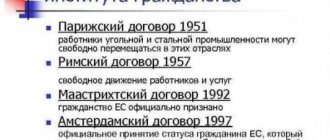Today there is an influx of migrants from territories that previously belonged to the Soviet Union. Individuals living there may attempt to obtain citizenship by right of soil. The presence of a condition allows you to go through the registration procedure using a simplified system. A child born in the state acquires such a right, regardless of the nationality and language of his parents.
What is “law of the soil”?
Important! Please keep in mind that:
- Each case is unique and individual.
- A thorough study of the issue does not always guarantee a positive outcome. It depends on many factors.
To get the most detailed advice on your issue, you just need to choose any of the options offered:
- Use the online chat in the lower corner of the screen.
- Call: Federal number: +7 (800) 511-86-74
Typically, a person acquires citizenship by birthright. In professional circles it is called filiation. In this case, the status is transmitted from the parents. In this case, the child receives it by right of blood. A person is considered to belong to a country if he shares common racial and linguistic characteristics with the main nation of the state. This right is especially widespread in Israel.
However, the law of soil is distinguished separately. It can be used by a person born in a certain territory. In this case, it does not take into account what civil status the parents have. An example of this is the USA. If a person decides to renounce citizenship, they may face great difficulties. In the Russian Federation today there is a principle of combining the above rights. However, the dominant principle is blood.
New law in the Russian Federation
There is a demographic crisis in the Russian Federation today. At the same time, a number of experts are confident that the resettlement of citizens from abroad will help change the current situation. But it is assumed that residents of the CIS will agree to come to Russia. However, they are stopped by the need to face a large number of legal aspects and resolve a number of bureaucratic issues. Therefore, the idea was expressed about the need to adopt a new law on obtaining citizenship in the Russian Federation.
In March, a new bill was submitted to Parliament for consideration. Its author was Konstantin Zatulin. The idea of the normative legal act was to classify all persons who were born on the territory of the USSR and even the Russian Empire as native speakers of the Russian language. Persons who were born in another state, but have direct ancestors who were born on the territory of the USSR, will also have the right to simplified acquisition of citizenship.
It was assumed that the requirement to renounce existing citizenship would be abolished. The fact is that most residents of neighboring countries cannot carry out the procedure.
Important! The law was not approved. Dmitry Peskov said that the Russian government has not yet clearly developed a position on this issue.
The most controversial issue was the possibility of dual citizenship. The fact is that it can cause problems in the field of property law. The level of knowledge of the Russian language among new citizens also raises concerns. There is reason to believe that it will be very low. At the same time, monitoring testing will be quite difficult.
In accordance with international standards, every person has the right to citizenship (Part 1, Article 15 of the Universal Declaration of Human Rights). The provisions of citizenship laws depend on the historical, cultural and legal traditions of the country, but all of them provide for the acquisition of citizenship by birth or by naturalization (accepting citizenship of a person who is not a citizen by birth, based on his application by decision of the competent authority).
In all countries, the legislator establishes the possibility of granting citizenship by birth
, although at this age a person cannot determine his preferences. This approach is based on the assumption that already at the birth of a certain person there is a high degree of probability that he will be loyal to the state with which he is connected through his parents or by virtue of being born on its territory.
In accordance with the International Covenant on Civil and Political Rights (Part 3, Article 24), every child
has the right to acquire citizenship.
The granting of citizenship by birth is based on two principles:
rights of blood and rights of soil.
The principle of jus sanguinis
means that a child acquires the citizenship of his parents regardless of his place of birth.
The principle of jus soli
assumes that a child acquires the citizenship of the state in whose territory he was born, regardless of the citizenship of his parents.
The legislation of most states enshrines mixed approaches
- a combination in one form or another of both principles. In accordance with the Federal Law “On Citizenship of the Russian Federation,” a child acquires the citizenship of our country, regardless of place of birth, if both of his parents or his only parent are citizens of Russia (the principle of jus sanguinis). At the same time, a child who is on the territory of our country also becomes a citizen of Russia if his parents are unknown and have not shown up within six months after his discovery (the principle of jus soli).
Securing the possibility of naturalization
, i.e., the adoption of a foreigner into the citizenship of a given state, is associated with the recognition of the right to change citizenship provided for in the Universal Declaration of Human Rights (Part 2, Article 15).
At the same time, all states establish clear criteria that an applicant for citizenship must meet. Typically, the possibility of naturalization is small if a person is not connected with the state by certain circumstances - origin, residence or birth on its territory, adoption, family ties or marriage ties with citizens of the country. In some countries, naturalization is encouraged by the state
and all persons who meet the established requirements receive citizenship (USA, Canada, France).
In others, the possibility of receiving citizenship is considered a privilege
, which depends on the discretion of government authorities (Germany, Japan, Switzerland). The right to grant citizenship is usually vested in the highest government bodies (president, government, parliament or court).
who have reached the age of 18 can apply for citizenship of the Russian Federation.
and are
legally capable.
They must meet certain requirements:
reside
in the country continuously for
5 years
after receiving a residence permit or submitting an application for citizenship;
speak Russian;
have a legal
source of subsistence;
apply to the competent authority of a foreign state with an application
to renounce
their existing citizenship;
give an obligation
to comply with the Constitution of Russia and the laws of the country.
An application for admission to citizenship is submitted to a diplomatic mission or consular office of Russia, if the person is abroad, or to the internal affairs authorities, if he resides in the territory of our country. The decision
on granting citizenship is made by the President of the Russian Federation.
By granting citizenship to a person, our country undertakes freedoms
, protection and patronage, including outside the country.
In a number of countries, the nature of acquisition of citizenship affects the ability to occupy certain government positions. Thus, only a citizen by birth can become President of the United States. In our country, the method of acquiring citizenship does not affect the status of a person; citizenship of the Russian Federation is uniform and equal, regardless of the grounds for acquisition (Part 1, Article 6 of the Constitution of the Russian Federation).
There are grounds for acquiring citizenship that are associated with territorial changes
or
the end of the existence of states.
Such grounds include automatic change of citizenship.
An example of this is the acquisition of a new status by Russian citizens as a result of the collapse of the USSR. Citizens of the Russian Federation were recognized as all
citizens of the former USSR permanently residing
in Russia
on the day the Law “On Citizenship of the Russian Federation” came into force, if within one year after this day they did not declare their
unwillingness
to be a citizen of the country.
In cases where a certain part of the territory of one state passes to another state, the residents of this territory exercise an option
- a voluntary choice of the state of citizenship. In this case, it is assumed that the person will live in the territory of the state of nationality.
Citizenship may be lost
both at the request of the interested party and by decision of government authorities. In many countries, loss of citizenship occurs automatically due to the voluntary acquisition of foreign citizenship or entry into the civil or military service of another state. Moreover, in a number of cases, the state may refuse a request to renounce citizenship or delay its satisfaction. In accordance with current legislation, a Russian citizen cannot be deprived of his citizenship or the right to change his citizenship (Part 3, Article 6 of the Constitution).
Exit
from the citizenship of our country is carried out
voluntarily
on the basis of an application from the interested person.
However, there are certain circumstances
that are grounds for
refusal
to renounce citizenship. These include failure to fulfill obligations to the country provided for by federal law; involvement as a defendant in a criminal case or the entry into force of a court sentence subject to execution in relation to this person. In addition, renunciation of citizenship is not allowed if this citizen does not have another citizenship and guarantees of its acquisition. This approach is aimed at preventing the emergence of new cases of stateless persons.
Loss of Russian citizenship without the will of the person concerned is permitted only if the decision on admission to citizenship is canceled due to the provision of false documents or knowingly false information.
Grounds for obtaining citizenship under this right
If a person plans to obtain citizenship by right of soil, he will have to go through a multi-step procedure. At the same time, it is quite extended in time. A person has the right to apply for participation in it on a general or simplified basis. First of all, you will need to obtain a temporary residence permit. Then you need to apply for a residence permit. Only after this does the right to obtain citizenship appear. In this case, the person must meet the requirements for:
- knowledge of the Russian language;
- age;
- financial situation.
If a person has the right to use a simplified scheme, you can skip the stage of registering a temporary residence permit. The applicant has the right to immediately apply for a residence permit. The scheme applies if a person appears on the territory of the USSR. But rights are also present in the following cases:
- close relatives have Russian citizenship;
- the applicant is a native speaker of Russian;
- Large investments were made in the Russian economy.
Today, there remains a need for mandatory renunciation of current citizenship. Only rare exceptions are provided. In this case, a person must know Russian. Demonstration of proficiency is carried out through testing. An alternative is to provide documentation of education. It must be obtained in Russia or on the territory of the USSR.
If the new laws are adopted, the registration procedure will also be simplified for a person who claims Russian citizenship by right of soil. The applicant will have to prove that he or his direct ancestors appeared on the territory of the Russian Empire or in the USSR. The need to pass a Russian language proficiency exam also remains. At the same time, you will not have to renounce your existing citizenship.
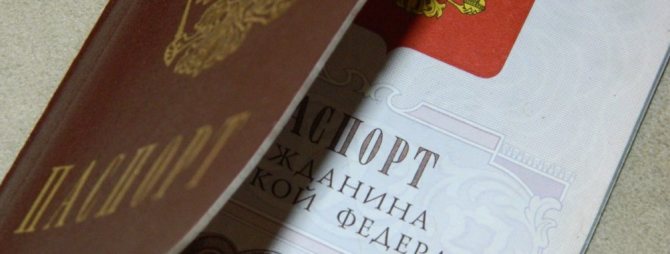
There are also alternative ways to obtain the corresponding status. Most people acquire it by right of birth. But a similar situation arises if one or both parents have the appropriate status. If citizenship is not obtained, the child will become stateless. All other persons have the right to use the following methods:
- submit an application in the general manner;
- contact representatives of the authorized body using a simplified procedure;
- carry out restoration of citizenship.
If a person does not have benefits that allow him to participate in the simplified procedure, the status will be assigned after at least 8 years. During this period, you will need to first obtain a temporary residence permit and then a residence permit. If it is possible to complete the registration according to a simplified scheme, the procedure will take much less time.
Note! Today, foreigners are actively participating in the resettlement program for compatriots. In this case, a person can obtain citizenship using a simplified scheme. Additional benefits are also provided. The likelihood of the adoption of an appropriate law that will allow formalizing the corresponding status under the law of soil also remains.
Who is entitled to Russian citizenship according to the “right of the soil”
A new principle of obtaining citizenship based on the “law of the soil” may be introduced in Russia. This was announced by Deputy Chairman of the State Duma Committee on National Affairs Ruslan Balbek .
According to him, recently a bill was registered in the State Duma, initiated by the first deputy chairman of the Committee on CIS Affairs, Eurasian Integration and Relations with Compatriots Konstantin Zatulin and Natalya Poklonskaya . The document involves introducing amendments to the laws “On Citizenship of the Russian Federation” and “On the Legal Status of Foreign Citizens in the Russian Federation.”
Legislators propose to classify citizens born on the territory of the former Russian Empire or the USSR, as well as those “who have relatives in a direct ascending line born in Russia,” into the category of “native speakers of the Russian language.”
In addition, it is proposed to abolish the requirement to provide a document on renunciation of citizenship of a foreign state, due to which “procedures for obtaining a residence permit and Russian citizenship itself are made dependent on foreign regulations, on the voluntarism of foreign officials.”
“If this law is adopted, it will be possible to obtain citizenship of the Russian Federation not only on the basis of blood and kinship, but also on the basis of soil. The main criterion will be knowledge of the Russian language, and also connections with the territories of the Soviet Union and the Russian Empire will be taken as a basis,” Balbec said.
“Right of soil” is a legal term that assigns the right to obtain citizenship of a particular state to persons born on the territory of that state, regardless of their race, nationality or language.
Similar ideas about making it easier for Russians and Russian-speaking people to move to Russia have arisen more than once. But until now they have not found serious implementation. Will it work this time?
“Russia is now becoming an increasingly attractive place for those people from the republics of the USSR who would like to make a career here or simply improve their living conditions,” says Vladimir Zharikhin, deputy director of the Institute of CIS Countries . — By the way, those who do not have higher education or highly qualified specialties do not particularly strive to stay in Russia. They come here to earn extra money, usually leaving their families at home. But many people who have a good profession do not mind moving to Russia, since there is less and less work for them in the republics. In almost the entire post-Soviet space, excluding Russia, Belarus and Kazakhstan, the processes of deindustrialization are intensifying. These people could be of benefit to us, given the gradual revival of industry in Russia. In addition, there are now more high-tech enterprises emerging.
But specialists from former Soviet republics face serious problems when moving to Russia. Because without citizenship they are not hired for qualified work. It is precisely these Russians and Russian-cultural people who should be given the green light. This is one of the objectives of the bill.
“Of course, it is possible to make it easier for former compatriots to enter Russia, but many questions arise as to how expedient this is,” says , director general of the Institute of Regional Problems . — For example, if we cancel the requirement to provide a document on renunciation of citizenship of a foreign country, we are actually introducing dual citizenship, which is not very good. A lot of new problems may arise here, including in the field of property law.
But that’s not even the main thing. Imagine, a person was born somewhere in a village in my beloved Central Asia. Something tells me that he doesn’t know Russian very well. Although the new law will give him the right to preferential receipt of Russian citizenship.
“SP”: — However, it is assumed that the law will apply specifically to native speakers of the Russian language, regardless of ethnicity.
— Who will assess the level of Russian language proficiency? The idea is beautiful, but the potential for corruption when assessing who can speak Russian and who cannot is almost limitless. I remember how the now deceased FMS was bursting with ideas on this topic. Then officials tried to create some kind of commissions to check migrants, opening centers where they were taught the simplest rules of behavior in Russia, the basics of the language. At the same time, people from our own Russian regions entered universities with the highest Unified State Exam scores, and then it turned out that they could not connect two words in Russian.
The mechanism for assessing a native speaker is, in fact, very simple, but difficult to control. The idea of "soil" dates back to the partition between Belgium and France. Then any Frenchman living in Belgium could easily move to France. But then we were talking about one people, artificially divided. But the Soviet people is still a very relative concept. Because different peoples lived in the USSR, united ideologically for a time. But even if we assume that there was a “great community of the Soviet people,” a quarter of a century has passed since that time. A whole generation has changed. Of course, we can proceed from the fact that there, as Vysotsky sang, “our former people.” But if we look at young people in Central Asia, they know very little Russian. Although just recently they began to teach more.
Generally speaking, in my opinion, it is necessary, first of all, to intensify the acquisition of citizenship by ethnic Russians. But I understand that such a law will inevitably cause accusations of nationalism against its authors. In addition, many Russians outside Russia work in sought-after positions and are considered good specialists. And here we can still be accused of the fact that we are going to leave the republics in Central Asia without technical intelligentsia. This is roughly what one of the Tajik officials told me when this idea was being promoted several years ago. Therefore, I repeat - the idea is correct, but it can lead to unexpected results. Therefore, in this case it is better to hurry slowly.
“SP”: Why did you remember this idea again now?
- I think there are several factors here. One of them is demographic. Of course, according to statistics, we now have no population decline. But aging occurs little by little, and in addition, within a year or two, mortality may again exceed the birth rate. In addition, we now actually have a situation where many Russians and immigrants from the republics of the USSR live and work in Russia. Perhaps the authors of the bill are simply aiming to legalize those of them who have been experiencing difficulties obtaining citizenship for more than one year. In particular, this applies to actual refugees from Ukraine.
“SP”: — By making it easier for those who support Russia to leave Ukraine, aren’t we making a mistake if we look at the long term? After all, then after some time it will be difficult to talk about the pro-Russian population of the Southeast?
— It is clear that any country is trying to preserve population groups loyal to itself in other countries. But in Ukraine this is now extremely problematic. It is in France that you can defend the interests of people from Africa without fear that a criminal case will be opened against you or that you will not be blown up in your own car. Therefore, perhaps we are giving a sign to those who live in Ukraine and sympathize with Russia that they always have the opportunity to leave if life becomes completely unbearable. But I still don’t think there will be a mass outflow. Tens of thousands, maybe hundreds of thousands of people will go to Russia, but not millions.
Source: Free Press
Required documents
The procedure requires the preparation of a documentation package.
| Documentation | Explanation |
| Statement. | Must be issued in at least two copies. It is acceptable to fill out paperwork by hand or on a computer. The document contains information about education, place of work and family. |
| A document confirming the existence of a source of livelihood. | Usually this is a certificate of income. This can be obtained by contacting your employer. However, sometimes a deposit document may be considered as proof of the availability of finances. |
| Confirmation of the fact of renunciation of citizenship. | To do this, you will need to contact the consulate of the state of which the person was previously a citizen. You will need to submit an application to an organization located in the Russian Federation. |
| Documentation confirming the fact of proficiency in Russian. | To do this you need to undergo appropriate testing. Based on its results, documentation is provided. |
| Passport or birth certificate. | If citizenship is issued by right of soil, a Soviet-style document or passport issued no later than 1974 will be required. |
The application must be completed in Russian. A notarized translation is acceptable. The list of documentation may vary. It depends on the country of which the person was a citizen. An agreement has been concluded with some states on the possibility of retaining citizenship.
Worth knowing! Documents will be reviewed within 3 to 6 months. Additionally, you will have to pay a state fee. Its size is 3500 rubles.
Determining the citizenship of a child in the Russian Federation
If the child was born in Russia
In the Russian Federation, all 2 described methods of legalizing the legal rights of a citizen are successfully implemented. They are used by natives and foreigners. Depending on the situation, a suitable method or their symbiosis is selected. In any case, when a child is born, his rights become legal. This applies to children having parents:
- originally from Russia;
- one is Russian, and there is no information about the other;
- one representative of the country of birth of the baby, and the other a foreigner, if the baby was born in the Russian Federation;
- without data on country affiliation;
- without any information about them (for abandoned newborns);
- foreigners, but wishing to take advantage of the right of soil, provided that the child was born on Russian territory.
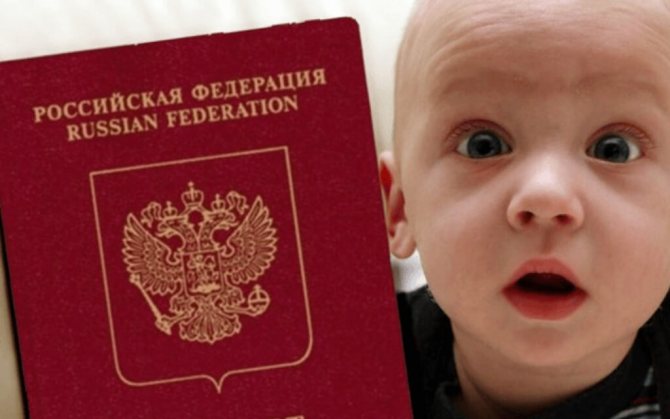
What law regulates citizenship issues?
In Russia there is a main document regulating issues of citizen status. This is the law of the Russian Federation No. 62 of May 31, 2002.
Why does a child need citizenship?
Until the age of 14, a child can be stateless, and there are no penalties for this. When you reach the age of fourteen, you are required to apply for a passport and then you cannot do without a certificate. In addition, obtaining citizenship by birth is important in the future if:
- applying to receive money for a newborn;
- departure to another country;
- making an entry in the parental passport;
- admission to preschool.
What documents are needed
To obtain citizenship of a newborn child, the following documents are required:
- Discharge from the maternity ward.
- Passports of representatives (father, mother, guardians) or confirmation of their absence.
- Identity document - certificate.
- Documented consent of the child's representatives.
- Adoption requires court approval.
Note: After applying, the result will be known after 10 days.
How to register correctly
The process of granting citizenship itself consists of 3 steps:
- Get a certificate from the maternity ward. For those born at home, a statement is written indicating the time and place of birth.
- Come to the registry office (up to the age of 1 month) attaching your parents’ passport.
- Put a stamp on the certificate.
What to do if the child was not born in the Russian Federation
When a child is born outside the country, he is issued a certificate - a metric card. You should go with it to the Russian consulate and local government authority to obtain a birth certificate (an apostille is also placed here for transfer to another state). Already in Russia you need to make a notarized translation and certify it with a notary’s seal.
Important In Russia, a new certificate is not issued. A legalized foreign will be valid, but the person will be recognized as a citizen.
Citizenship confirmation procedure
If a person needs to confirm his country affiliation, he can go through a simplified confirmation procedure. So, for people from the Russian Federation, this is 5 years, if the conditions of permanent residence are met. For children, when receiving a passport, it is enough to provide a birth certificate with the required stamp. The following documents are also accepted:
- international passport;
- diplomat's passport;
- military service ticket;
- service passport.
When proof of citizenship is not needed
Confirmation of the status of belonging to the country is not required for people who have been permanently residing in the Russian Federation since 02/06/1992 and who have not renounced it. The length of stay abroad does not affect the status. If a person lived (period 02/06/1992 - 07/01/2002), his parents are Russian, he will also be recognized as a citizen.
